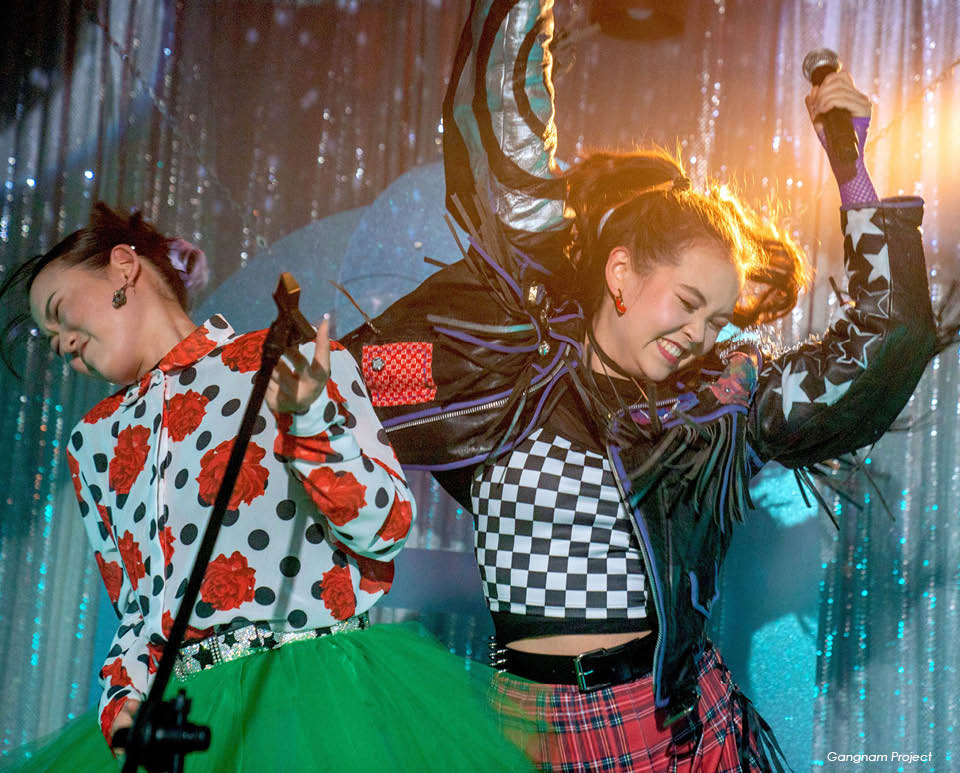
Veteran kids entertainment creator and showrunner, Sarah Haasz, talks about Gangnam Project, a deeply personal tween series she describes as “K-drama lite”, which releases in Spring 2024.
At 16, Sarah Haasz, fresh from a trip to her relatives in Korea, decided to write a book about how difficult it was to be what she calls “between generations”. Born in Korea and raised in Canada, she says she “had it all mapped out... being pulled into different directions and not being accepted”.
The being-between theme repeated at various points in her life. One aha-moment she talks about came in her Twenties, on another trip to Korea. When her family in Korea asked about her partner and whether they were going to marry, she said: “I have a boyfriend but he’s not Korean. They’re like, ‘Oh, okay’, as in, that’s fine.”
In contrast, her parents in Canada were concerned. “My parents were afraid that my relatives would have a hard time accepting me marrying someone who wasn’t Korean. [They] had the 1975 ideals from when we moved to Korea... so that’s all they knew, they were stuck in a time warp,” she says.
More than two decades later, these experiences form the basis of Haasz’s series, Gangnam Project, which releases in Spring 2024.
Set in Korea, the 10-episode half-hour tween dramedy is about Hannah Shin (played by Julia Kim Caldwell) a spirited Canadian-Korean teen with dreams of becoming a K-pop star and connecting with her Korean heritage. When she accepts a summer job as an English tutor at an elite K-pop training school in Korea, she finds herself at odds with the K-pop universe she is thrust into.
Directed by Filipino Canadian film and television director, Romeo Candido (The Next Step), along with Justin Wu and Gloria Kim, Gangnam Project was co-commissioned by Canada’s CBC Kids and CBBC. Haasz is the series’ showrunner along with Candido.
“For over 30 years I wanted to tell my story as a first-generation immigrant from Korea living in Canada, who journeys to Korea to explore her roots and experiences an identity crisis both comically and dramatically,” Haasz says.
She adds that “the heart of the series is the idea of accepting and being accepted, and finding out your identity when you’re bi-racial. Or even when you were born in one place and moved to anot...
Veteran kids entertainment creator and showrunner, Sarah Haasz, talks about Gangnam Project, a deeply personal tween series she describes as “K-drama lite”, which releases in Spring 2024.
At 16, Sarah Haasz, fresh from a trip to her relatives in Korea, decided to write a book about how difficult it was to be what she calls “between generations”. Born in Korea and raised in Canada, she says she “had it all mapped out... being pulled into different directions and not being accepted”.
The being-between theme repeated at various points in her life. One aha-moment she talks about came in her Twenties, on another trip to Korea. When her family in Korea asked about her partner and whether they were going to marry, she said: “I have a boyfriend but he’s not Korean. They’re like, ‘Oh, okay’, as in, that’s fine.”
In contrast, her parents in Canada were concerned. “My parents were afraid that my relatives would have a hard time accepting me marrying someone who wasn’t Korean. [They] had the 1975 ideals from when we moved to Korea... so that’s all they knew, they were stuck in a time warp,” she says.
More than two decades later, these experiences form the basis of Haasz’s series, Gangnam Project, which releases in Spring 2024.
Set in Korea, the 10-episode half-hour tween dramedy is about Hannah Shin (played by Julia Kim Caldwell) a spirited Canadian-Korean teen with dreams of becoming a K-pop star and connecting with her Korean heritage. When she accepts a summer job as an English tutor at an elite K-pop training school in Korea, she finds herself at odds with the K-pop universe she is thrust into.
Directed by Filipino Canadian film and television director, Romeo Candido (The Next Step), along with Justin Wu and Gloria Kim, Gangnam Project was co-commissioned by Canada’s CBC Kids and CBBC. Haasz is the series’ showrunner along with Candido.
“For over 30 years I wanted to tell my story as a first-generation immigrant from Korea living in Canada, who journeys to Korea to explore her roots and experiences an identity crisis both comically and dramatically,” Haasz says.
She adds that “the heart of the series is the idea of accepting and being accepted, and finding out your identity when you’re bi-racial. Or even when you were born in one place and moved to another place. You physically look like you belong there, but you go back and you feel like you’re having a difficult time being accepted”.
Gangnam Project, which took six years to make, was produced in Toronto and Korea by Haasz’s Pillango Productions, which she founded in Toronto in 2019, and Aircraft
Pictures, also based in Canada, with financial participation of Shaw Rocket Fund and the Canada Media Fund. Federation Kids & Family distributes the show worldwide.
Gangnam Project follows Haasz’s long career in kids TV, including roles with YTV, CBC Kids, Disney Jr Canada and Family Channel. Among the 2,000+ hours of kids programming that carry her credits, she has been involved in TV series and movies such as The Next Step, Raising Expectations and Justin Time.
Since forming Pillango, which focuses on live action and animation production for family viewing, her credits include Circuit Breakers, a live action anthology series for Apple TV+, and Step by Step Let’s Dance, a live action docu-dance series for TVO Kids.
“I’ve been in TV for a long time, and I know that there has to be a hook, and the hook was K-pop,” she says.
With authenticity at the top of her priority list, she tapped the experience of one of her best friends’ husband, who belonged to an early K-pop group managed by YG Entertainment. “I drew from his experience, drew from my experience and came up with the concept of a girl who’s biracial who goes to Korea to find her roots,” she says.
Gangnam Project features an original soundtrack by recording artist, songwriter, producer and musician, August Rigo, who has written songs for BTS, U Smile for Justin Bieber and Gotta Be You for One Direction.
Haasz describes the show as “K-drama lite”, with a lot of family elements, some drawn from her own life.
For instance, “my parents weren’t very accepting of my husband initially, and it caused some tension in the family. I put that in the series, where the father has a falling out with his mother – the main character’s grandmother. There’s a scene where they forgive each other and our whole cast and crew were just crying.
“It’s about forgiveness. It’s not necessarily just about the father forgiving the mother and vice versa. Everybody has had these moments in their life where they come to see past themselves and forgive in order for there to be peace in the family as a whole... all those moments, like identity and forgiveness, accepting, acceptance. These are universal themes.. what we’re trying to convey still resonates internationally, no matter what culture you’re from.”
Using the storytelling example of a deeply emotional Korean drama about a terminally ill mother who prepares her developmentally challenged son to cope after her death, Haasz says she tried to tap the best of Korean techniques for Gangnam Project. “I really wanted to mine the emotion, to make it resonate, relatable”.
Because of the series Canadian financing, most of the filming was done in Canada, with about a week in Korea with four of the actors and a local Korean crew. The week in Korea was more than she thought would be possible on the initial budget. At the time, it seemed like “icing on the cake,” she says. In hindsight, she adds, it was absolutely necessary and she wouldn’t hesitate to do it again. If there is a season two (no announcement at press time), she plans to film in Korea.
In all, the show took six years to make. “I needed to find the right people.. and it took a long time,” Haasz says. Her dream team included a writer “who walked in the same shoes as I did”. She eventually chose Romeo Candido, “who experienced what I experienced, even though we are from different cultures... he knew my voice.” Candido also became the series co-showrunner.
Although the series is anchored in her own experience, she’s keen to point out that “it’s not about me... it’s trying to portray what I felt and keeping it relatable. People who watch this can relate not because it’s about a Korean girl. It’s because of identity... bi-racial children wonder who they are, they want to find their identity.”
Although it might feel like gratuitous promotion for the show, Haasz says her choices have been validated by the response so far. “Cast members came up to me and the first thing they said was ‘thank you for making a story about us’... ‘thank you for telling my story’. I felt happy. I felt content that, you know, that this is the right path that I took the story in”.
If she would do anything differently, Haasz says she would have made more episodes, with more stories. And then there are the stories that emerged in production. “Even though they are playing characters, cast members have stories to tell as well,” she says. All of which lays the groundwork for a possible second season.
Some parts of the production felt like coming full circle for Haasz. For instance, filming locations, by total coincidence, included the college in Canada where her mother learned English as second language and her father took machine shop courses after the family emigrated to Canada.
Perhaps more than a TV production, the series is part of her arrival at a new place in her life. “The more I visit [Korea], the more I feel comfortable in my skin. I think it’s a maturity thing,” she says, describing a trip to Korea with her parents as an adult as a “whole new experience”.
“Going [to Korea] as an adult with my parents was a completely different experience,” she says. “This was the first time they had stayed in a hotel in Korea. It was like they were tourists in their home country. They absolutely loved it. They were so excited to show me the Korea they remembered as opposed to the Korea they were seeing right now. And it was really nice.”
Her own journey with fitting in has a happy ending. Still married to the same person, she is now a mother of three children aged 21, 18 and 11, and her parents’ concerns have long been left behind. “Now everything’s fine,” she says. “We have three beautiful bi-racial children who identify as both Korean and Canadian. They love their Korean side, love the Canadian side.”
What about her lead character, Hannah? Answers in 2024.























